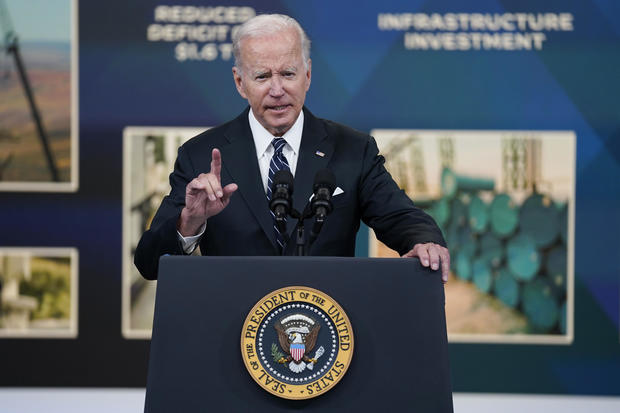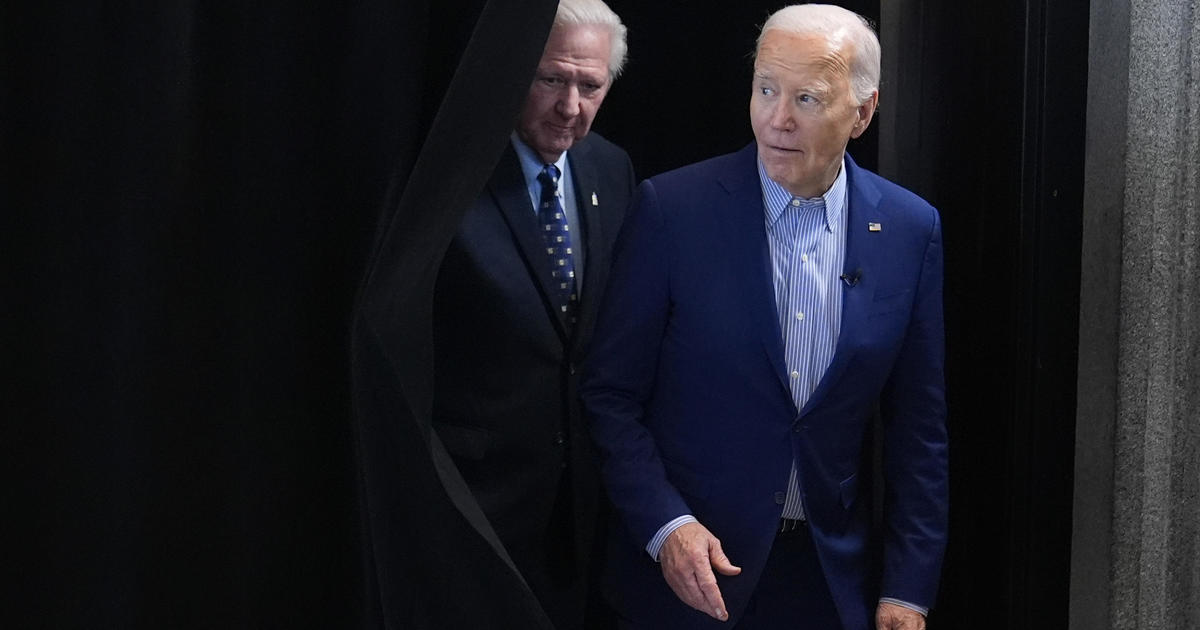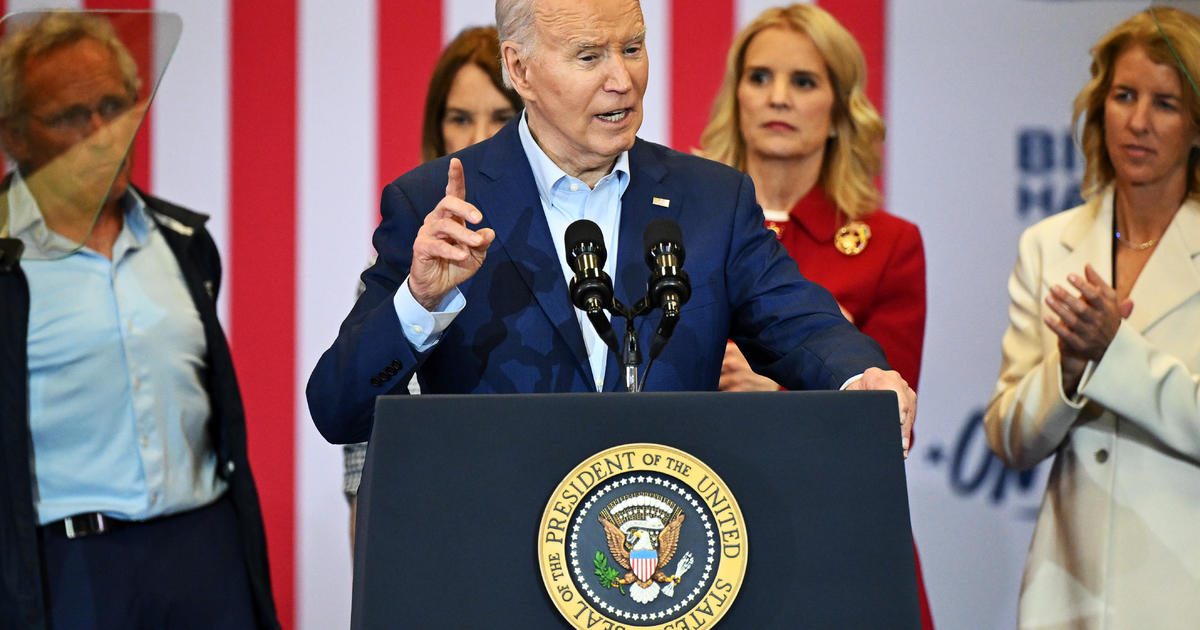Biden calls for three-month federal gas tax "holiday"
Washington — President Joe Biden on Wednesday called on Congress to suspend federal gasoline and diesel taxes for three months — an idea that's intended to ease financial pressures at the pump, but that also reveals the political toxicity of high gas prices ahead of the midterm elections in November.
He is also urging states to suspend their own gas taxes or provide similar relief, given that state gas taxes run an average of 30 cents on the gallon.
"Today I'm calling on Congress to suspend the Federal gas tax for the next 90 days, through the busy summer season, busy travel season," Mr. Biden said Wednesday.
At issue is the 18.4 cents-per-gallon federal tax on gas and the 24.4 cents-per-gallon federal tax on diesel fuel. If the gas savings were fully passed along to consumers, Americans would save roughly 3.6% at the pump with prices averaging about $5 a gallon nationwide. But many economists and lawmakers from both parties view the idea of a gas tax holiday with skepticism, suggesting it won't do much to help consumers and could even increase demand.
House Speaker Nancy Pelosi was noncommittal on Mr. Biden's push for a gas tax holiday, and Rep. Peter DeFazio, chair of the House Committee on Transportation and Infrastructure, raised concerns about the proposal.
"Although well-intentioned, this policy would at best achieve only minuscule relief while blowing a $10 billion dollar hole in the Highway Trust Fund that would need to be filled if we want to continue to fix crumbling bridges, address the spike in traffic deaths, and build a modern infrastructure system," DeFazio said in a statement. "Furthermore, encouraging state governments to suspend their gas taxes undermines the impact of the Bipartisan Infrastructure Law by reducing funds available to states to spend on infrastructure improvements."
Republicans were even more critical. Top Senate Republican John Thune called the proposal "dead on arrival," and GOP Senator John Barrasso labeled the gas tax holiday a "desperate Hail Mary pass."
Barack Obama, during the 2008 presidential campaign, called the idea a "gimmick" that allowed politicians to "say that they did something." He also warned that oil companies could offset the tax relief by increasing their prices.
Energy Secretary Jennifer Granholm admitted that 18 cents, if consumers actually see that full reduction, is a "modest amount." But that should be combined by state gas tax reductions, and some price reductions from oil and gas companies, she said.
Mr. Biden on Wednesday urged companies to pass along savings to consumers, although Washington doesn't have a mechanism enforce that. Congress would have to impose a gas tax holiday. The president doesn't have that authority.
"I call on the companies to pass this along, every penny of this 18-cent reduction, to the consumers," the president said. "There's no time now for profiteering."
High gas prices pose a fundamental threat to Mr. Biden's electoral and policy ambitions. They've caused confidence in the economy to slump to lows that bode poorly for defending Democratic control of the House and the Senate in November.
The president's past efforts to cut gas prices — including the release of oil from the U.S. strategic reserve and greater ethanol blending this summer — have done little to produce savings at the pump, a risk that carries over to the idea of a gas tax holiday.
Mr. Biden has acknowledged how gas prices have been a drain on public enthusiasm when he is trying to convince people that the U.S. can still pivot to a clean-energy future. In an interview with The Associated Press last week, he described a country already nursing some psychological scars from the coronavirus pandemic that is now worried about how to afford gas, food and other essentials.
"If you notice, until gas prices started going up," Mr. Biden said, "things were much more, they were much more optimistic."
The president can do remarkably little to fix prices that are set by global markets, profit-driven companies, consumer demand and aftershocks from Russia's invasion of Ukraine and the embargoes that followed. The underlying problem is a shortage of oil and refineries that produce gas, a challenge a tax holiday cannot necessarily fix. Mr. Biden on Wednesday defended his decision to support Ukraine and impose restrictions on Russia.
"We could have turned a blind eye to Putin's murderous ways, and the price of gas wouldn't have spiked the way it has," the president said. "I believe that would have been wrong. I believe then and I believe now, the free world had no choice."
Mark Zandi, chief economist at Moody's Analytics, estimated that the majority of the 8.6% inflation seen over the past 12 months in the U.S. comes from higher commodity prices due to Russia's invasion and continued disruptions from the coronavirus.
"In the immediate near term, it is critical to stem the increase in oil prices," Zandi said last week, suggesting that Saudi Arabia, the United Arab Emirates and a nuclear deal with Iran could help to boost supplies and lower prices.
Republican lawmakers have tried to shift more blame to the president, saying he created a hostile environment for domestic oil producers, causing their output to stay below pre-pandemic levels.
Senate Republican leader Mitch McConnell mocked the idea of a gas tax holiday in a February floor speech. "They've spent an entire year waging a holy war on affordable American energy, and now they want to use a pile of taxpayers' money to hide the consequences," he said.
Pelosi, has previously pointed out that Washington would have to find a way to pay for the tax holiday, saying funds would have to come out of the Highway Trust fund.
"The question is," she said at the time, "Is it worth having to go get money, to return to cover the shortfall and the trust fund, in order to get a break to the Big Oil companies?"
Administration officials maintain that the $10 billion cost of the gas tax holiday would be paid for and the Highway Trust Fund kept whole, even though the gas taxes make up a substantial source of revenue for the fund. The officials didn't specify any new revenue sources.
The president has also called on energy companies to accept lower profit margins to increase oil production and refining capacity for gasoline.
This has increased tensions with oil producers: Mr. Biden has judged the companies to be making "more money than God." That kicked off a chain of events in which the head of Chevron, Michael Wirth, sent a letter to the White House saying that the administration "has largely sought to criticize, and at times vilify, our industry."
Asked about the letter, Mr. Biden said of Wirth: "He's mildly sensitive. I didn't know they'd get their feelings hurt that quickly."
Energy companies are scheduled to meet Thursday with Granholm to discuss ways to increase supply.
Still, the White House pointed out Wednesday that, "Already, the United States produced more oil under the first year of this administration than it did under the first two years of the prior administration, and is on track to set new records next year."
Rebecca Kaplan and Alan He contributed to this report.




